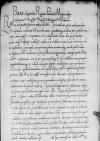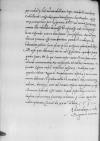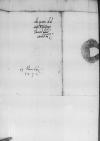Iucundum fuit nobis audire Paternitatem Vestram salvam et incolumem, gratumque ovibus suis pastorem istuc advenisse. Cupimus, ut ea dignitate sana diu perfruatur. Litteras magnifici ⌊Alfonsi Valdesii⌋ nobis a Paternitate Vestra simul cum aliarum Paternitati Vestrae scriptarum exemplo accepimus grato animo, atque paulo post rediit a ⌊caesarea maiestate⌋ aulicus noster ⌊Fabianus⌋, legationis munus written over minus⌈minusmunusmunus written over minus⌉ apud illius maiestatem caesaream ita, ut per nos consilioque Paternitatis Vestrae edoctus erat, peregit supplicationemque in rebus nostris per ipsum Valdesium porrexit. Verum ut in aliis postulationibus nostris apud ⌊illius maiestatem⌋ infortunatae semper fuimus, ita et in his nihil concessum est, ubi enim ad exipeditionem ventum erat, ⌊Valdesius⌋ gravi aegritudine correptus est, adeo ut medici dubitarent de salute eius, et quem sic languentem ⌊Fabianus⌋ reliquit; nescimus, quid hactenus agatur cum illo.
⌊Scipio de Summa⌋ in pristinam gratiam ⌊caesaris⌋ rediit et liberalius adhuc remuneratus, nempe ⌊Apuliae⌋ et ⌊Idrunto⌋ praefectus est. ⌊Valdesius⌋ percontanti ⌊Fabiano⌋, an ⌊Scipionem⌋ in illo officio nostro pati debeamus nec ne, respondit hoc esse in arbitrio nostro, nullas tamen nobis desuper expedivit litteras, qua in re atque aliis, quae Valdesius cum Fabiano verbo tenus contulit, ⌊Cornelius Duplicius Sceperus⌋ post discessum Fabiani litteras expedire et nobis mittere debuit. Sed saepius frustratae, nihil futurum credimus. ⌊Nicolaus Maria de Summa⌋ castellanus Barensis a ⌊caesare⌋ etiam remuneratus, filio suo prioratus sancti Nicolai collatus est.
Ad haec concesserat nobis ⌊maiestas caesarea⌋
 BCz, 1601, p. 620
per medium Paternitatis Vestrae summas rebellium ⌊Ligii Marrhe⌋ et ⌊marchionis Castellanete⌋ confiscatas, quam concessionem, dum ⌊Neapolim⌋ misissemus, compertum fuit ⌊caesaream maiestatem⌋ vel commissarios eius, omnia illis rebellibus donavisse et restituisse ante. ⌊Valdesius⌋ ⌊Fabiano⌋ respondit priorem donationem iure subsistere, nos autem scimus illorum priorem esse, tum obtentam, quando et a nobis pro illa laboratum exstitit, hinc plane Paternitas Vestra perspicere poterit, an de ⌊illius maiestate ⌋iuste queri debeamus nec ne. Alii quam plurimi, quorum servitia ignota sunt et hi, qui aerario nostro vivunt et rem suam curant, abunde remunerantur, nos consumptis tot milibus ducatorum in servitio caesaris nihil impetrare possumus. ⌊Valdesius⌋ inquit oportere totum ⌊regnum Neapolitanum⌋ distribui, si omnes remunerari deberent. Equidem nostri et servitiorum nostrorum multorumque milium ducatorum auri ad servitia ⌊caesaris⌋ impensorum priusquam ceterorum habenda esset ratio. Si quid postea litterarum a ⌊Cornelio Duplicio⌋ habuerimus, faciemus certiorem Paternitatem Vestram, quam bene valere optamus.
BCz, 1601, p. 620
per medium Paternitatis Vestrae summas rebellium ⌊Ligii Marrhe⌋ et ⌊marchionis Castellanete⌋ confiscatas, quam concessionem, dum ⌊Neapolim⌋ misissemus, compertum fuit ⌊caesaream maiestatem⌋ vel commissarios eius, omnia illis rebellibus donavisse et restituisse ante. ⌊Valdesius⌋ ⌊Fabiano⌋ respondit priorem donationem iure subsistere, nos autem scimus illorum priorem esse, tum obtentam, quando et a nobis pro illa laboratum exstitit, hinc plane Paternitas Vestra perspicere poterit, an de ⌊illius maiestate ⌋iuste queri debeamus nec ne. Alii quam plurimi, quorum servitia ignota sunt et hi, qui aerario nostro vivunt et rem suam curant, abunde remunerantur, nos consumptis tot milibus ducatorum in servitio caesaris nihil impetrare possumus. ⌊Valdesius⌋ inquit oportere totum ⌊regnum Neapolitanum⌋ distribui, si omnes remunerari deberent. Equidem nostri et servitiorum nostrorum multorumque milium ducatorum auri ad servitia ⌊caesaris⌋ impensorum priusquam ceterorum habenda esset ratio. Si quid postea litterarum a ⌊Cornelio Duplicio⌋ habuerimus, faciemus certiorem Paternitatem Vestram, quam bene valere optamus.
 BCz, 1601, p. 620
per medium Paternitatis Vestrae summas rebellium
BCz, 1601, p. 620
per medium Paternitatis Vestrae summas rebellium 

